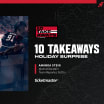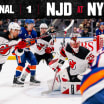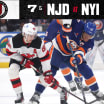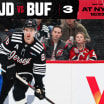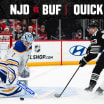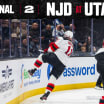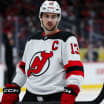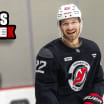In a realistic sense, the New Jersey Devils birth could be traced to 1967 when the National Hockey League -- under the aegis of President Clarence Campbell -- expanded from six to twelve teams.
Once criticized by old-guard NHL leaders such as Toronto's Conn Smythe, the doubling of NHL franchises in the late 1960s proved eminently successful. In a very short time, other North American cities such as Vancouver and Buffalo clamored for major league hockey.
Gradually, relentlessly, the world's greatest hockey league continued to grow and at the start of the 1972-73 campaign, two more clubs were welcomed -- the New York Islanders and Atlanta Flames.
DEVILS OVER THE DECADES: Ch. 2 - How it all Began
Stan Fischler documents the history of the New Jersey Devils Franchise
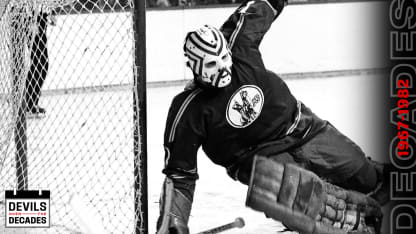
By
Stan Fischler
Special to NHL.com
PREVIOUS ARTICLES
PAST CHAPTERS
Ch. 1 - The Birth of Hockey in Jersey
Ch. 2 - How it all Began
Ch. 3 - The First Devils Roster
Ch. 4 - The Milestone First Season
Ch. 5 - The Great Gretzky Uproar
Ch. 6 - Getting Even with Gretzky
Ch. 7 - A New Coach, A New Era
Ch. 8 - The Birth of a Rivalry
Ch. 9 - A Showdown Season
Ch. 10 - Carpenter's Last Stand
Ch. 11 - Enter Lou, Enter Changes
Ch. 12 - Exit Carpenter, Enter Schoenfeld
Ch. 13 - Devils Over the Decades
Ch. 14 - The Hot Homestretch
Ch. 15 - Showdown with the Rangers
Ch. 16 - A Classic Win
Ch. 17 - Playoff Bound - Almost!
Ch. 18 - First Playoff Berth
Ch. 19 - First Playoff Win
Ch. 20 - Washing the Capitals
Ch. 21 - Meadowlands Melodrama
Ch. 22 - Goodbye Caps, Hello Boston
Ch. 23 - Taking on the Bruins
Ch. 24 - Yellow Sunday in East Rutherford
Ch. 25 - Close but no Cigar
Ch. 26 - Best Devils Quotations
Ch. 27 - Build-Up to a Letdown
Ch. 28 - The Russian Invasion of New Jersey
Ch. 29 - Slava and Sergei Arrive
Ch. 30 - Evolution of the Russians
Ch. 31 - 1990s Playoffs or Bust
Ch. 32 - Adding Muscle on top of Muscle
Ch. 33 - Coaching Change; Cunnif to McVie
Ch. 34 - McVie for Victory
Ch. 35 - Bring on the Penguins
Ch. 36 - Chasing the Elusive Penguins
Ch. 37 - Building a Champion - Get Stevens!
Ch. 38 - Explosive Devils of 1991-92
Ch. 39 - Breezing Along with the Breeze
STANLEY CUP WINS
2003 - Devils Stanley Cup Run
2000 - Lucky Seven
2000 - Winning in Dallas
1995 - Built off a Lockout, Cup Champs
SPECIAL EDITIONS
Devils Cavalcade of Coaches
Coaches Sidebar
Best Devils Quotations
WHAT'S NEXT
A new Devils Over the Decades article will be published every Tuesday, Friday and Sunday morning. Check NewJerseyDevils.com to continue reading!
But the NHL's success proved an inspiration to other entrepreneurs.Led by attorney Gary Davidson, a World Hockey Association emerged in the Fall of 1972 as a direct competitor to the NHL. The WHA immediately began siphoning off such stars as Bobby Hull, Derek Sanderson and Gerry Cheevers, among many others.
Had the NHL not been able to withstand the traumatic WHA incursion, it's conceivable that there never would have been a New Jersey Devils franchise. But the NHL remained bullish about its future and accepted bids from Kansas City and Washington for play in 1974-75 at a cost of $6 million per franchise.
Kansas City's NHL Scouts, who would play out of KC's new Kemper Arena, eventually would become the Garden State's Devils. For the moment, however, Missourians nurtured hopes that the state's second NHL team-- following the Blues -- would do as well as the one in St.Louis.
New league alignment rules allowed expansion franchises to reach the Stanley Cup Final in 1968, 1969 and 1970. Each of those three yeas found the Blues in the Final -- losing each team -- but with NHL hockey wildly successful in St.Louis.
Alas, this was not the case in Kansas City. A combination of talent-dilution, the Scouts less than competitive on the ice. While they received solid goaltending from Denis Herron, the club could not sufficiently entice their fans to fill Kemper Arena.
"It was tough," said general manager Sid Abel. "We weren't exactly overloaded with stars."
The arithmetic -- 15 wins, 54 losses, and 11 ties -- over the 80 game schedule underlined Abel's point. A year later, the Scouts slipped by five points. Even worse, the NHL agreed that a franchise switch was in order and the team moved to Denver where it was re-christened the Colorado Rockies.
Calling McNichols Arena home, the Rockies actually gained a playoff berth in 1977-78 but lost to the Philadelphia Flyers in the opening round. It would be the last playoff the franchise would enjoy for many a moon.
As the Rockies collapsed, owner Jack Vickers sold the club to New Jersey trucking executive Arthur Imperatore in June 1968. In a sense, Imperatore lucked out when he was convinced to hire ebullient Don (Grapes) Cherry as head coach.
While the popular Grapes could charm the fans and media, he could not play goal and, therein were a host of problems. "One look at our goalies," chimed Cherry, "convinced me that our problems between the pipes weren't big, they were colossal!"
Cherry's Rockies sat at the bottom of the Smythe Division and, eventually, the club's failures led Don to clash with management. By the start of the 1980-81 season Grapes had been fired and replaced by Billy McMillan.
When Imperatore learned that a huge new arena was being erected at New Jersey's Meadowlands, Arthur decided it was time "Go East" and relocate to East Rutherford in his home state. Ah, but there were three problems -- the Rangers, Islanders, and Flyers -- each of which voted to veto any attempt to move a franchise to the New York-New Jersey market.
Frustrated by the tri-team opposition, Imperatore sold the Rockies to Buffalo cable television magnate Peter Gilbert and former Colorado Lieutenant Governor Mark Hogan. Unfortunately, Cherry's departure and subsequent failures on the ice and behind the bench.
That convinced Gilbert that his Rockies never would make it in Denver. He put the team up for sale and found a buyer in Dr. John McMullen, a limited partner of the New York Yankees and later owner of the Houston Astros.
McMullen was convinced that he could move the club to East Rutherford and that the State of New Jersey could support NHL hockey. Plus, he was willing to pay indemnity fees to the Rangers, Islanders, and Flyers. Thus, the sale was made official on May 27, 1982.
"We're very pleased," said Robert E. Mulcahy, chief executive of the New Jersey Sports and Exposition Authority. "We've been working for years to get a team."
At last, major league hockey had become embedded in the Garden State and -- as every Devils fan knows -- the rest is NHL history.
(NEXT: CONSTRUCTING THE FIRST DEVILS ROSTER)

